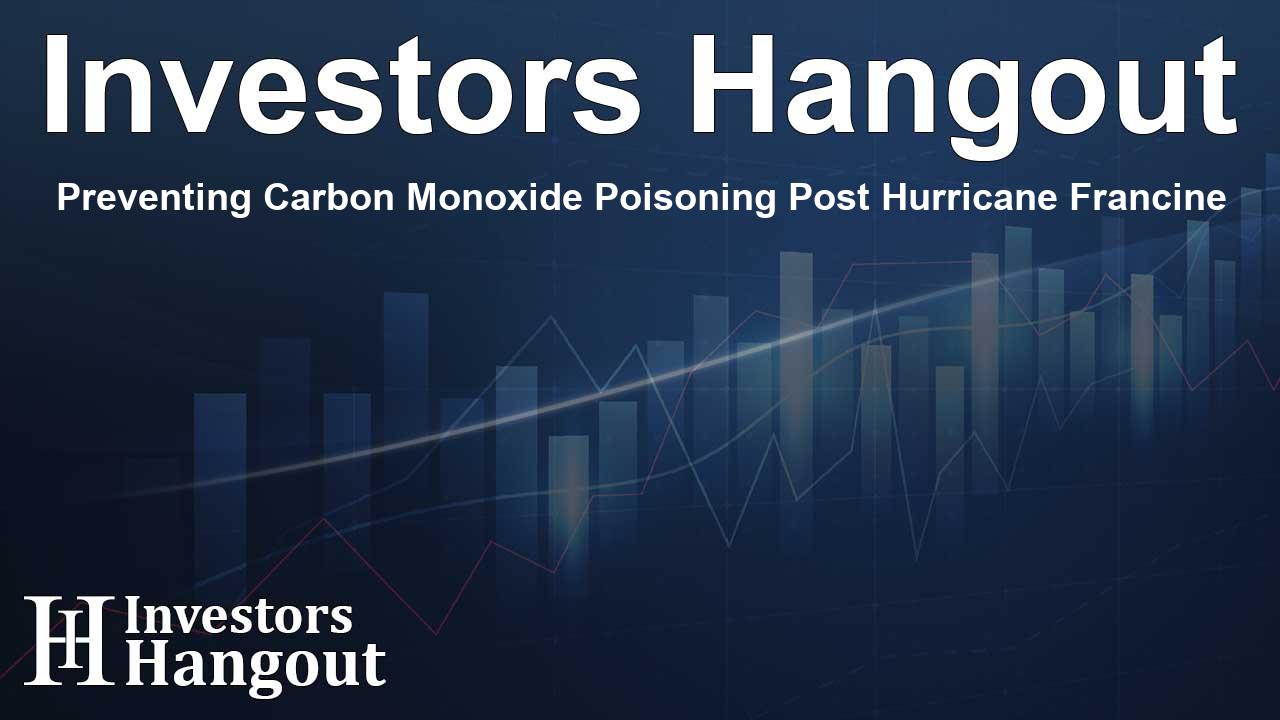Preventing Carbon Monoxide Poisoning Post Hurricane Francine

Protecting Yourself from Carbon Monoxide After Hurricane Francine
The U.S. Consumer Product Safety Commission (CPSC) highlights the importance of safety during and after hurricanes, especially regarding the dangers of carbon monoxide (CO) poisoning. As Hurricane Francine approaches, residents are urged to take preventive measures to safeguard their lives and homes.
Understanding the Risks: Why CO is Dangerous
In the aftermath of storms that disrupt electrical power, the risk of CO poisoning increases significantly, particularly with the use of portable generators. Known as the "invisible killer," CO is colorless and odorless, making it particularly dangerous. Symptoms of CO poisoning can appear rapidly, causing victims to lose consciousness without warning. Data indicates that over 400 lives are lost each year due to CO exposure, with a notable portion of these fatalities linked to portable generators.
Safety Recommendations for Generator Use
To help reduce the risk of CO poisoning during storms, consider the following critical safety tips:
- Always operate portable generators outdoors, at a distance of at least 20 feet from your home and any windows or doors.
- Avoid using generators in enclosed spaces, as this does not allow sufficient air flow and can lead to dangerous CO buildup.
- Choose generators equipped with CO shut-off safety features. These are specifically designed to turn off the generator when carbon monoxide levels become dangerously high, significantly enhancing safety.
- Ensure your generator has been properly maintained and refer to the manufacturer's instructions for safe operation.
Ensuring Smoke and CO Alarms are Functional
The presence of functioning smoke and carbon monoxide detectors is essential. Installing battery-operated alarms, especially interconnected units that alert throughout the home, can save lives by providing early warning in emergencies. Regularly test these alarms to ensure they function correctly, and replace batteries as necessary. Never disregard alarm signals; leave the area immediately and call for help if needed.
Appliance Safety After Flooding
Following any flooding incidents, be cautious with electrical appliances. Wet appliances pose risks of electrical shock. Always consult a professional to evaluate appliances that may have been submerged and replace components that were in contact with water.
Safe Practices: Candles and Charcoal Use
Power outages often lead people to seek alternative light sources, but caution is paramount. Unattended burning candles can ignite nearby objects. If using candles, ensure they are placed away from flammable materials and extinguished when leaving the room. Additionally, never use charcoal indoors, as this can produce lethal levels of CO.
CPSC Resources for Further Information
The CPSC offers various resources for safety education and can guide you in protecting your household. Their mission is to partner with the public to enhance consumer product safety and mitigate risk during emergencies.
Frequently Asked Questions
What should I do if my generator emits a strange smell?
If your generator emits a noxious smell, turn it off immediately and check for CO buildup in the area. Ensure proper ventilation and seek professional help if needed.
How can I tell if my CO alarm is working?
Test your CO alarm monthly. If it beeps or lights up, it is operational. Replace it immediately if it does not respond.
What precautions should I take with fuel storage?
Store fuels for generators in a safe, cool, and ventilated area away from living spaces. Always use approved containers for fuel storage.
What are the signs of CO poisoning?
Signs include headache, dizziness, weakness, nausea, and confusion. If you experience these symptoms, seek fresh air and medical attention immediately.
Are there safety features to look for when buying a generator?
Look for generators that meet safety standards such as UL 2201, which indicates features like CO shut-off capabilities designed to enhance safety.
About Investors Hangout
Investors Hangout is a leading online stock forum for financial discussion and learning, offering a wide range of free tools and resources. It draws in traders of all levels, who exchange market knowledge, investigate trading tactics, and keep an eye on industry developments in real time. Featuring financial articles, stock message boards, quotes, charts, company profiles, and live news updates. Through cooperative learning and a wealth of informational resources, it helps users from novices creating their first portfolios to experts honing their techniques. Join Investors Hangout today: https://investorshangout.com/
Disclaimer: The content of this article is solely for general informational purposes only; it does not represent legal, financial, or investment advice. Investors Hangout does not offer financial advice; the author is not a licensed financial advisor. Consult a qualified advisor before making any financial or investment decisions based on this article. The author's interpretation of publicly available data shapes the opinions presented here; as a result, they should not be taken as advice to purchase, sell, or hold any securities mentioned or any other investments. The author does not guarantee the accuracy, completeness, or timeliness of any material, providing it "as is." Information and market conditions may change; past performance is not indicative of future outcomes. If any of the material offered here is inaccurate, please contact us for corrections.